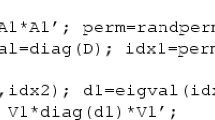Abstract
A class of linear programs is given in which the relaxation method for inequalities, under the same operating rules as Khacian's method, is not polynomial in the length of the input. This result holds for any value of the relaxation parameter.
Similar content being viewed by others
References
S. Agmon, “The relaxation method for linear inequalities,Canadian Journal of Mathematics 6 (1954) 382–392.
P. Gacs and L. Lovasz, “Khacian's algorithm for linear programming”, Report C.S. 750, Computer Science Department, Stanford University (Stanford, CA, 1979).
J.L. Goffin, “The relaxation method for solving systems of linear inequalities”,Mathematics of Operation Research 5 (1980) 388–414.
J.L. Goffin, “Acceleration in the relaxation method for linear inequalities and subgradient optimization”, working paper 79-10; Faculty of Management, McGill University, April 1979, to appear in the proceedings of a task force on nondifferentiable optimization held at IIASA, Laxenburg, Austria, December 1978.
L.G. Khacian, “A polynomial algorithm for linear programming”,Doklady Akademii Nauk SSSR, 244 (5) (1979) 1093–1095, translated inSoviet Mathematics Doklady 20 (1) (1979) 191–194.
T. Motzkin and I.Y. Schoenberg, “The relaxation method for linear inequalities”,Canadian Journal of Mathematics 6 (1954) 393–404.
A.M. Ostrowski, “On over and under relaxation in the theory of the cyclic single step iteration”,Mathematical Tables and other Aids to Computation 7 (1953) 152–159.
C.J. Papadimitriou, “Efficient search for rationals”,Information Processing Letters 8 (1979) 1–4.
N.Z. Shor, “Convergence rate of the gradient descent method with dilatation of the space”,Kibernetika 6 (2) (1970) 80–85, translated inCybernetics 6 (2) (1970) 102–108.
N.Z. Shor, “Cut-off method with space extension on convex programming problems”,Kibernetika 13 (6) (1977) 94–95, translated inCybernetics 13 (6) (1977) 94–96.
V.A. Skokov, “Note on minimization methods using space dilatation”,Kibernetika 10 (4) (1974) 115–117, translated inCybernetics 10 (4) (1974) 689–692.
D.B. Yudin and A.S. Nemirovskii, “Informational complexity and effective methods for the solution of convex extremal problems”,Ekonomika I Mathematicheskie Metody 12 (2) (1976) 357–369, translated inMatekon 13 (3) (1977) 25–45.
Author information
Authors and Affiliations
Additional information
This research was supported in part by the D.G.E.S. (Quebec), the N.S.E.R.C. of Canada under grant A 4152, and the S.S.H.R.C. of Canada.
Rights and permissions
About this article
Cite this article
Goffin, J.L. On the non-polynomiality of the relaxation method for systems of linear inequalities. Mathematical Programming 22, 93–103 (1982). https://doi.org/10.1007/BF01581028
Received:
Revised:
Issue Date:
DOI: https://doi.org/10.1007/BF01581028



